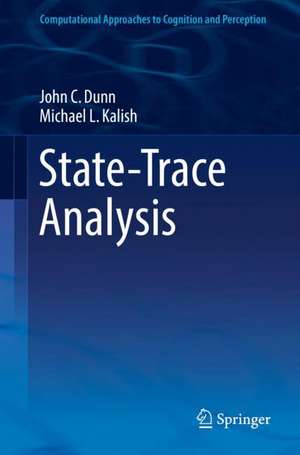State-Trace Analysis: Computational Approaches to Cognition and Perception
Autor John C. Dunn, Michael L. Kalishen Limba Engleză Paperback – 20 feb 2018
The book begins by discussing the general framework for thinking about the relationships between independent variables, latent variables, and dependent variables. Subsequent chapters provide a software package that can be used to fit state-trace models as well as additional designs and examples. The book concludes with a discussion on potential extensions of STA and additional aspects of its application.
State-Trace Analysis will be of interest to researchers and graduate students working in experimental, applied, and cognitive psychology.
Preț: 379.09 lei
Nou
Puncte Express: 569
Preț estimativ în valută:
72.54€ • 75.94$ • 60.02£
72.54€ • 75.94$ • 60.02£
Carte tipărită la comandă
Livrare economică 05-19 aprilie
Preluare comenzi: 021 569.72.76
Specificații
ISBN-13: 9783319731285
ISBN-10: 3319731289
Pagini: 161
Ilustrații: XIII, 123 p. 37 illus.
Dimensiuni: 155 x 235 mm
Greutate: 0.2 kg
Ediția:1st ed. 2018
Editura: Springer International Publishing
Colecția Springer
Seria Computational Approaches to Cognition and Perception
Locul publicării:Cham, Switzerland
ISBN-10: 3319731289
Pagini: 161
Ilustrații: XIII, 123 p. 37 illus.
Dimensiuni: 155 x 235 mm
Greutate: 0.2 kg
Ediția:1st ed. 2018
Editura: Springer International Publishing
Colecția Springer
Seria Computational Approaches to Cognition and Perception
Locul publicării:Cham, Switzerland
Cuprins
Part I: Theory.- Chapter 1. The Logic of State-Trace Analysis.- Chapter 2. Monotonicity.- Chapter 3. Functional Dependence.- Part II: Application.- Chapter 4. Statistical Methodology.- Chapter 5. Mixed Designs with Continuous Dependent Variables.- Chapter 6. Independent Observations with Binary Dependent Variables.- Chapter 7. More Examples.- Part III: Further Topics.- Chapter 8. Bayesian Approaches.- Chapter 9. Final Comments.- Appendix.- References.
Notă biografică
John C. Dunn, BA, Ph.D., is an Emeritus Professor in the School of Psychological Science at the University of Western Australia. Dr Dunn’s research has focused on the application of mathematical models to recognition memory, decision making, reasoning, categorization, and eyewitness testimony. He has published over 100 papers in numerous journals including Psychological Review, Proceedings of the National Academy of Science, and the Journal of Experimental Psychology: Learning, Memory, and Cognition.
Michael L. Kalish, M.S., Ph.D., is a Professor in the Department of Psychology at Syracuse University. He has published in numerous journals, including: Psychological Review, Cognitive Science, and several sections of the Journal of Experimental Psychology. Dr. Kalish's research involves describing the cognitive mechanisms responsible for the nature of human learning and memory, with a particular focus on categorization and dimensional attention.
Michael L. Kalish, M.S., Ph.D., is a Professor in the Department of Psychology at Syracuse University. He has published in numerous journals, including: Psychological Review, Cognitive Science, and several sections of the Journal of Experimental Psychology. Dr. Kalish's research involves describing the cognitive mechanisms responsible for the nature of human learning and memory, with a particular focus on categorization and dimensional attention.
Textul de pe ultima copertă
This book provides an introduction to the theory, method, and practice of State-Trace Analysis (STA), and includes a detailed tutorial on the statistical analysis of state-trace designs. The book offers instructions on how to perform state-trace analysis using the authors' own publicly-available software in both Matlab and R.
The book begins by discussing the general framework for thinking about the relationships between independent variables, latent variables, and dependent variables. Subsequent chapters provide a software package that can be used to fit state-trace models as well as additional designs and examples. The book concludes with a discussion on potential extensions of STA and additional aspects of its application.
State-Trace Analysis will be of interest to researchers and graduate students working in experimental, applied, and cognitive psychology.
State-Trace Analysis will be of interest to researchers and graduate students working in experimental, applied, and cognitive psychology.
Caracteristici
Provides a comprehensive overview of State-Trace Analysis Discusses the mathematical foundations of State-Trace Offers detailed instructions on how to perform State-Trace Analysis


